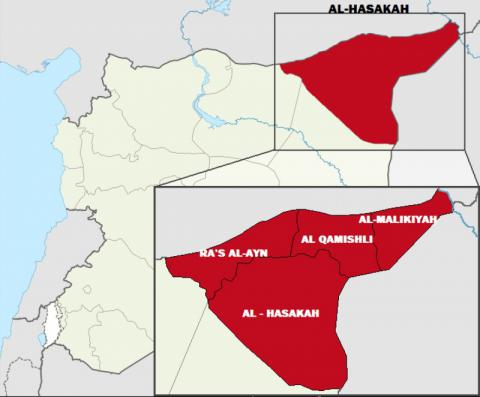
On 31 March 2015 and 7 April 2015, Alkarama and Human Rights Guardians referred to the Independent International Commission of Inquiry on the Syrian Arab Republic (CoI Syria) the cases of three Syrian citizens abducted between July and October 2013 by the al-Nusra Front and the Kurdish forces in the Al Hasakah Governorate. Since 2012, the Al Hasakah Governorate – situated in the far north-east corner of Syria between the Turkish and Iraqi border – has been the scene of a battle between, amongst others, Bachar al-Assad's Army, the Islamic State, the al-Nusra Front and the Kurdish forces.
On 23 July 2013, Raad Ramadan, a 34-year-old Syrian Kurd merchant from Qamishli – the main city of Syrian Kurdistan in the Al Hasakah Governorate, on the border with Turkey and close to Iraq – was travelling with his friend and colleague in the tobacco trade when they were stopped at a checkpoint in Khirbat Al Banat – a village on the Syrian-Turkish border in the area of Ra's al-Ayn – by members of the al-Nusra Front, an armed group which pledged allegiance to Al Qaeda in 2013. The members of the patrol, wearing al-Nusra black uniforms, abducted Raad, most likely because of his Kurdish ethnic background, since his friend, a Syrian Arab, was left free.
At the time of Raad's arrest, the Kurdish separatist forces and the al-Nusra Front were fighting over the control of Ras al-Ayn, considered of strategic importance. Days before Raad's abduction, the Kurdish forces had conquered the town of Ras al-Ayn, but not its surroundings, which were still under the control of al-Nusra. In such a context, Raad's abduction appears as a measure of retaliation following the loss of Ras al-Ayn.
Worried over his fate, Raad's family appointed mediators to ask the al-Nusra Front about his whereabouts, but to no avail.
On 2 September 2013, 21-year-old Rafaa Al Mohammad was travelling back to his home in Qamishli from the village of Zubaidah where he had just visited relatives when, reaching a checkpoint in the village of Al-Hamra in Al Hasakah province, he was stopped and arrested by a patrol of the Asayish, a police force run by the Kurdish Democratic Union Party (PYD), an offshoot of the Kurdistan Workers' Party (PKK) in Turkey.
Worried over his fate, his family contacted the Asayish forces who, after admitting Rafaa's arrest, went on denying this allegation. His relatives also filed a formal complaint with the Office of the Syrian Ministry for National Reconciliation Affairs in Qamishli, which never responded.
The third disappearance in this area occurred on 27 October 2013. Raed Mahameed, a 36-year-old Palestinian born in Qamlishli and living with his wife and four children in Al Jawadia – a village in the the Al Malikiyah District, in the upper northeastern corner of the Al Hasakah Governorate, at the border with Turkey and Iraq – was arrested as he was working in his clothing store "Boutique Tabarak" by patrol of the People's Protection Unit (YPG), the armed wing of the Kurdish Democratic Union Party in Syrian Kurdistan and one of the Kurdish forces operating in Syria.
As Raed's arrest occurred just a day after the Kurdish forces seized control of Yarubiya, close to the Iraqi border, after a battle against the al-Nusra Front and the Islamic State. His relatives believe that he was abducted because the YPG thought he had links with these jihadist groups. Worried about his fate, his family inquired at several detention centres under YPG control. While they were able to locate him and, at first, authorised to visit him in the YPG-controlled prison of Al-Malikiyah, from 4 November 2014, they were denied visits and have not heard from him since.
Alkarama contends these cases are amounting to enforced disappearances, a practice strongly prohibited by international human rights and Humanitarian Law (IHL). "As parties to the conflict, all Syrian armed groups have a legal and moral duty to abide by international humanitarian and human rights law. They cannot exempt themselves from responsibility for gross human rights violations against civilians and must be held accountable as well," recalls Inès Osman, Alkarama's Legal Officer for the Mashreq.
In view of the information presented above, Alkarama referred Raad's, Rafaa's and Raed's cases to the CoI Syria established by a Resolution of the Human Rights Council on 22 August 2011 to investigate "all alleged violations of international human rights law [in Syria] since March 2011" and to ensure that "perpetrators of violations, including those that may constitute a crime against humanity, are held accountable."
For more information or an interview, please contact the media team at media@alkarama.org (Dir: +41 22 734 1007 Ext: 810)
